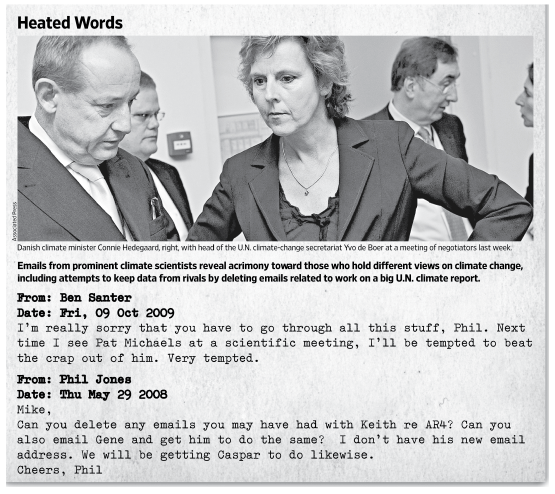
Climate Emails Stoke Debate
Scientists' Leaked Correspondence Illustrates Bitter Feud over Global Warming
By Keith Johnson
The Wall Street Journal
November 23, 2009
The scientific community is buzzing over thousands of emails and documents -- posted on the Internet last week after being hacked from a prominent climate-change research center -- that some say raise ethical questions about a group of scientists who contend humans are responsible for global warming.
The correspondence between dozens of climate-change researchers, including many in the U.S., illustrates bitter feelings among those who believe human activities cause global warming toward rivals who argue that the link between humans and climate change remains uncertain.
Some emails also refer to efforts by scientists who believe man is causing global warming to exclude contrary views from important scientific publications.
"This is horrible," said Pat Michaels, a climate scientist at the Cato Institute in Washington who is mentioned negatively in the emails. "This is what everyone feared. Over the years, it has become increasingly difficult for anyone who does not view global warming as an end-of-the-world issue to publish papers. This isn't questionable practice, this is unethical."
In all, more than 1,000 emails and more than 2,000 other documents were stolen Thursday from the Climate Research Unit at East Anglia University in the U.K. The identity of the hackers isn't certain, but the files were posted on a Russian file-sharing server late Thursday, and university officials confirmed over the weekend that their computer had been attacked and said the documents appeared to be genuine.
"The selective publication of some stolen emails and other papers taken out of context is mischievous and cannot be considered a genuine attempt to engage with this issue in a responsible way," the university said.
Most climate scientists today argue that the earth's temperature is rising, and nearly all of those agree that human activity is likely to be a prime or at least significant cause. But a vocal minority dispute one or both of those views.
A partial review of the hacked material suggests there was an effort at East Anglia, which houses an important center of global climate research, to shut out dissenters and their points of view.
In the emails, which date to 1996, researchers in the U.S. and the U.K. repeatedly take issue with climate research at odds with their own findings. In some cases, they discuss ways to rebut what they call "disinformation" using new articles in scientific journals or popular Web sites.
The emails include discussions of apparent efforts to make sure that reports from the Intergovernmental Panel on Climate Change, a United Nations group that monitors climate science, include their own views and exclude others. In addition, emails show that climate scientists declined to make their data available to scientists whose views they disagreed with.
The IPCC couldn't be reached for comment Sunday.
In one email, Benjamin Santer from the Lawrence Livermore National Laboratory in Livermore, Calif., wrote to the director of the climate-study center that he was "tempted to beat" up Mr. Michaels. Mr. Santer couldn't be reached for comment Sunday.
In another, Phil Jones, the director of the East Anglia climate center, suggested to climate scientist Michael Mann of Penn State University that skeptics' research was unwelcome: We "will keep them out somehow -- even if we have to redefine what the peer-review literature is!" Neither man could be reached for comment Sunday.
The emails were published less than a month before the opening of a major climate-change summit in Copenhagen.
Representatives of the American Association for the Advancement of Science, a large professional organization, expressed concern that the hacked emails would weaken global resolve to curb greenhouse-gas emissions. The association believes "that climate change is real, it is related to human activities, and the need to counteract its impacts is now urgent," said Ginger Pinholster, an association spokeswoman. She added that the association's journal, Science, evaluates papers solely on scientific merit.
John Christy, a scientist at the University of Alabama at Huntsville attacked in the emails for asking that an IPCC report include dissenting viewpoints, said, "It's disconcerting to realize that legislative actions this nation is preparing to take, and which will cost trillions of dollars, are based upon a view of climate that has not been completely scientifically tested."
Mojib Latif, a climate researcher at Germany's Leibniz Institute of Marine Sciences, said he found it hard to believe that climate scientists were trying to squelch dissent. Mr. Latif, who believes in man-made global warming but who has co-authored a paper ascribing current cooling to temporary natural trends, said, "I simply can't believe that there is a kind of mafia that is trying to inhibit critical papers from being published."

Jeffrey Ball contributed to this article.
Copyright 2009